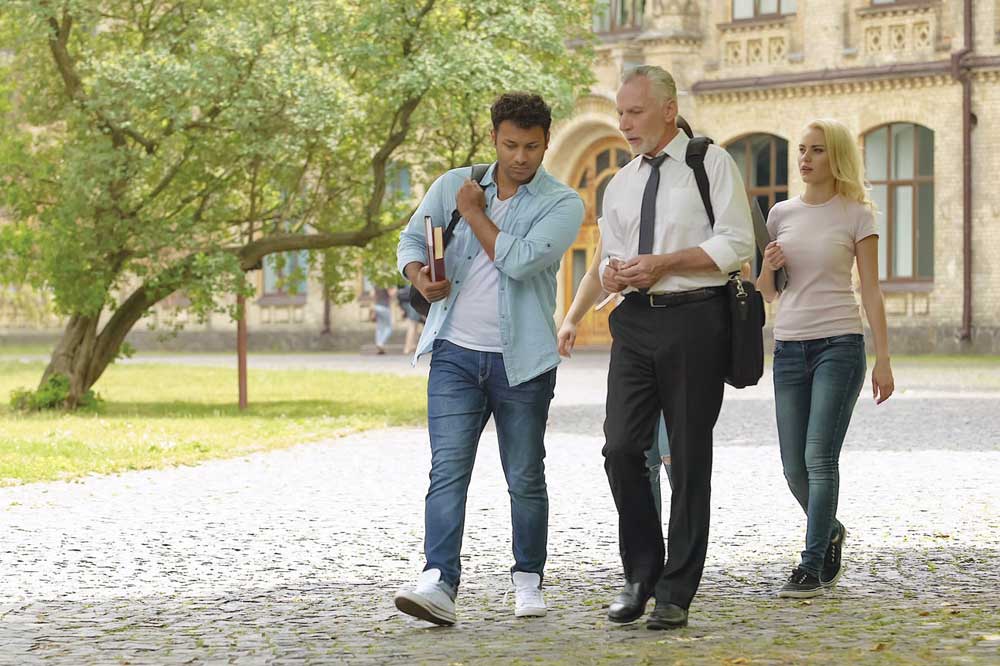
By Shanalee Gallagher
I began my path towards a career in local government with a feeling that I wanted to change things. Living in Northern California’s Bay Area, I was disappointed with policies I felt were shortsighted. Some of the policies seemed experimental and risky; I suspected that had they been evaluated properly, the Bay would not be suffering from some of its most distressing issues, such as the housing crisis.
Looking to make a difference at the state, federal, and tribal levels, I was drawn to Mills College for graduate studies because it offered a master of public policy (MPP) degree. I liked that this degree focused more on research, analysis, evaluation, and strategic long-term planning, which I felt were the best tools for policy work.
During my first semester, I discovered the Mills ICMA Student Chapter, which played an important role in my professional growth. The student chapter president mentored me, empowered me to host my own ICMA event, and I later took on the role of chapter president.
Despite caring deeply about local issues, I had not actually considered working in local government when starting my MPP program. But in 2017, ICMA member Alexandra Orologas sponsored my attendance to ICMA’s West Coast Regional Summit in Burlingame, California. I met more than 40 professionals at the event and had countless meaningful conversations. I left truly inspired by what I had experienced, and started to consider a career in local government.
The real “game changer” on my career map was attending the ICMA University Workshop Leadership Strategies to Move Communities from Disruption to Connection and Renewal. I had never witnessed senior management speak about their professional and personal experience handling tragedies their communities experienced and even admitting their mistakes. Importantly, I saw these leaders sharing lessons learned and providing real-time support to other jurisdictions facing similar situations.
Chance Encounters Can Change Your Course
At the summit I met Pam Antil, Assistant City Manager of Santa Barbara, California. Pam was smart, experienced, and delightful to be around, and I decided right then that I’d do anything to work for her. I called her many times over the next few months, and eventually secured an internship. Not only did I leave the summit with an exceptional number of new mentors, the experience was invaluable and completely changed the course of my career.
This brings me to lesson number one: Chance encounters can change your course. You never know where you might meet someone who changes your career, so show up for events, try out new organizations, and go to meetings – even if they’re a little inconvenient or don’t seem exceptionally inspiring. There’s always a possibility it won’t be worth your time, but one thing is for sure: if you don’t show up, you can’t meet anybody.
During my time in Santa Barbara, I was assigned to various projects and advocated for some of my own projects from personal interest. Lesson number two: Having a strong mentor is helpful; if you see an opportunity, they can help you grab it.
My internship experience prepared me for my first post-graduate Local Government Management Fellowship (LGMF), and for choosing the right fellowship. The fellowship I ultimately chose was for the City of Evanston – a mid-sized city adjacent to Chicago, IL.
Moving across the country to take a new job seemed daunting. I interviewed for LGMF in Evanston with Assistant City Manager, Erika Storlie. When Erika sensed I was having a difficult time with this decision, she was kind enough to take time out of her day and talk me through my other offers. Erika has become a great mentor and is still helping me navigate my next steps, both inside and outside of Evanston.
Lesson three: If you have the opportunity to choose your boss, do it.
Finding the Right Mentors
Mentoring and guidance is important at all career stages, particularly when you see a course change ahead. Luckily, experienced professionals generally love helping those of us just starting out in local government. ICMA has opened a lot of doors for me, and I am grateful for the lasting relationships I have made thus far.
Here are some personal strategies I recommend for acquiring strong mentors:
- Don’t be afraid to access your local network. While in graduate school, I scoured the Mills College Alumni list for professionals working in local government and reached out to them with specific requests. For example, I found Melissa McDonough at the City of Berkeley, California, and asked if she could help me prepare for an interview. To my surprise, although to this day we have never met in person, she did. You can also cross-check ICMA members with your university alumni list, which can give you enough commonality to start a conversation.
- Take advantage of ICMA’s amazing network of members. Check out the online Who’s Who at icma.org. I have reached out to many people for assistance on a variety of topics, including best practice research, advice on how to complete a specific task, process-related topics, and more. You can reach professionals in almost any position through ICMA, and receive a guaranteed warm welcome and abundance of help. ICMA also offers a number of career coaching options – take advantage of them. I was "matched” with Kevin Caitlin, City Manager of Springfield, Michigan, an LGMF alumnus. I have been in touch with him consistently since our meetup at the conference. If you are a current LGMF, how many times have you accessed your coach since 2018 ICMA Conference?
- Pick a supervisor or team leader, not a position. It may sound counterintuitive, but choosing a role based on the person you will report to, rather than the job description, can help propel your career exponentially. It’s possible to have a mentor who is not also your boss, but nobody knows your professional life as well as your boss. A great boss is able to understand what’s important to you, what your strengths and skillset is, and is able to assign work accordingly. These are also characteristics of a great boss; how awesome does it feel to receive a project based on your strengths?
My last piece of advice is, if you are not interviewing with your future boss, ask to do so.
- Use LinkedIn. Throw a message out there and see what happens. I found one of my best mentors on LinkedIn. He graciously offered one free phone conversation to help me navigate a sticky power dynamic. One year later, Nick Kittle, Government Performance and Innovation Coach, is still helping me navigate sticky situations and the daily pickle.
LinkedIn can also be used to find professionals in positions you are aiming for and find professionals who have specific skill sets or expertise of interest. Both are great icebreakers.
- The "ask." Finding a mentor is about building a relationship. It’s is important to upfront and be specific about what you need, so that mentors understand clearly how they can support you. In discussion with a colleague, Lyzz Schwegler, Communications Director for Sister District, she informed me that “people are constantly asking us for professional advice in such a non-specific way and it makes it impossible for us to support them.” If you don’t know exactly what you need, but you want a monthly call to ask questions, that’s ok – just say that. And, as willing as local government professionals are to help, keep in mind that they are busy. Be sure to keep your request appropriate – asking a City Manager for weekly calls might be challenging.
Example:
Dear Director of Lion Tamers,
[Explain who you are.]
I am an early-career lion tamer and I am looking for guidance and career development.
[Explain why you are contacting this person specifically; show that you have done your initial research and carefully selected them.]
I have experience in lion taming, however, managing lion tamers is another type of cat herding. When I saw that you are the Director of Lion Tamers for the City of Santa Fe, I was thrilled. I am from Las Cruces myself, and it’s my dream to manage lion tamers for a mid-sized city in the Southwest. I would love to discuss the unique challenges you have faced managing lion tamers in the Southwest, and if you have any guidance or suggestions as I look for my next role.
[Suggest a method of contact and schedule to show you are well-organized and serious.]
If you are willing, I am available for an initial phone call at the following times.
Once you have spoken, you can agree on what schedule and method of contact is best for both of you (but more so, for them). You will agree on how, how often, and what times they prefer to be contacted.
- Know your own strengths and weaknesses. It can be difficult to assess your own abilities and areas of growth. If you’re not sure, ask professors, former bosses, and co-workers for an honest assessment. Ignorance is not bliss in this regard! It’s impossible to grow, and impossible to select a team of mentors, without being aware of what you don’t know.
- Choose different mentors for different purposes. I have different mentors for different reasons, based on their expertise. This is a good strategy because it puts less burden on any individual mentor, and you can avoid “mentor burnout.”
Make It Count
When you attend an ICMA event, as a student, intern, Fellow, or early-career professional, keep your eyes and ears open. EVERY interaction is an interview. Show interest, don’t waste anyone’s time, have a specific ask, provide clear expectations, use your resources wisely, and keep it professional.
If you want something, be persistent and work for it. If you are in the early stages and will be applying for jobs, know that it’s not easy. Get used to the word no.
Lastly, in the spirit of giving back as many of my own mentors have done for me, please reach out! If you have reached a more advanced stage and are seeking more tips, I can be reached via LinkedIn or through ICMA’s Who’s Who page.PM

Shanalee Gallagher is an ICMA Local Government Management Fellow, Evanston, Illinois (sgallagher@alumnae.mills.edu).
New, Reduced Membership Dues
A new, reduced dues rate is available for CAOs/ACAOs, along with additional discounts for those in smaller communities, has been implemented. Learn more and be sure to join or renew today!
